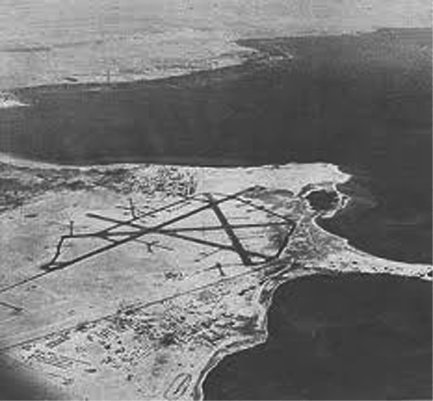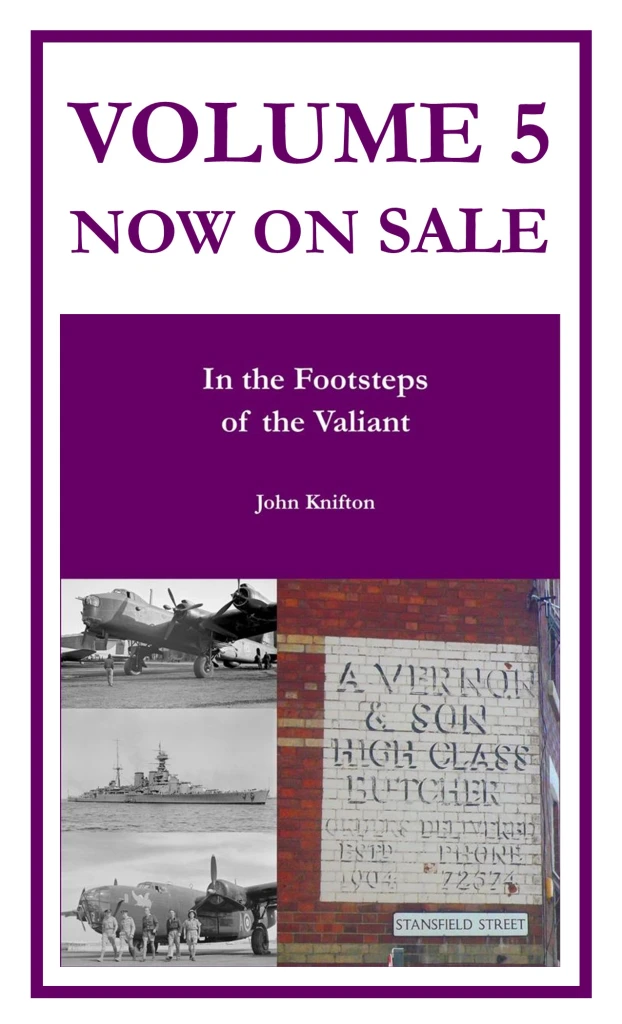When I wrote the first part of my review of the book “In for a Penny, In for a Pound : The Adventures and Misadventures of a Wireless Operator in Bomber Command” written by Howard Hewer, I had never written a book review before, so I suppose I can now say “Welcome to my second book review”.
Last time I mentioned how the author talked about his experiences in the RAF in Britain, but how he was then transferred to the Middle East, bombing the Germans and Italians with Vickers Wellingtons:
In actual fact the Wellington was probably the best bomber used in this theatre of war in the early years. At least they weren’t using these Bristol Bombays as bombers:
And they weren’t forced to use these biplanes as bombers, for want of any aircraft at all (which did actually happen!):
Howard Heyer describes how the anticolonial attitudes encountered in England continued in the Middle East when he is posted to RAF Kabrit near the Suez Canal:
At Kabrit, the Station Commander lived in a “sumptuous two storey permanent house”. The officers were all billeted in nice wooden houses next to the Officers’ Mess but the sergeants lived elsewhere, in the desert, sleeping on straw mattresses in tents outside the camp. The single shower was just a pipe with no showerhead and the water was heated by the sunshine. The food wasn’t very good either with the buns at Christmas dinner containing not caraway seeds but weevils, regarded by the rather cynical diners as a valuable source of protein. Here is the author, in the middle of the crew of five:
When the time came for introductions, the commander of the base, Squadron Leader B, singled the two Canadians out from the rest and said:
“I see that two of you are Canadians. I’ll tell you right now that if we have any trouble with you, it’s the high jump for both of you.”
Howard is flying combat missions at such long range that they need to land their aircraft at airstrips in the desert both on the way to the target and on the way back. That doesn’t prevent the station commander, who doesn’t fly in combat, stopping his car as he drives past Howard and telling him off for having a button which is not shined properly. Such attitudes eventually lead to a mutiny.
On January 29th 1942, Squadron Leader B had a notice put up ordering:
“All aircrew are to report, properly dressed, to the Station Warrant Officer’s Office at 1300 hours”.
Every member of aircrew had already “been on Ops” in the previous week and in some cases, the night before:
In such cases, men are supposed to have a whole day’s rest with no reporting anywhere. The fact that the Station Warrant Officer has the nickname, “Louie the Rat”, probably sums up the attitude of the 50 men who assembled. He told them to draw rifles for rifle drill. They told him that sergeants only carry side arms so they don’t do rifle drill. Louie then gave them the message from Squadron Leader B that the men were all slack and they all needed smartening up.
At the first command of “Order Arms”, an Australian gentleman told Louie a convenient place to stick his rifle and threw his gun to the floor. He was immediately placed under close arrest and marched off to the Guard Room followed by 50 or so angry sergeants of all nationalities who demanded to be placed under close arrest as well.
And the account goes on from there for another couple of pages. Again, something I have never heard of before, and, like the Cranwell Riot, unknown to Google as well. The book does have a good summary of the situation though, one which could have been applied to a good many RAF bomber squadrons during this period…
“…a long period of minor abuse and lack of caring, a condition of “negative leadership.”
And what’s “negative leadership”?
Well, it can perhaps be summed up in the words of the officer who welcomed the crews to RAF Marham, right at the beginning of the book…
“Well chaps, the glamour period is over. Casualties in this command have been high, and they are on the rise as we make more and more flights further into Germany. I must tell you then that many of you will not be with us a few weeks or a month from now. Good luck to you all.”
Unbelievably, this officer was outdone by the Squadron Medical Officer:
“I hope it doesn’t happen to any of you, but in the event that you find yourself trapped in a burning aircraft with no chance of escape, best to get things over with in a hurry. Lean directly over the flames, open your mouth and inhale strongly. The fire should scorch the lungs and cause almost instant death, much preferable to burning slowly. Well good luck chaps.”
The Bomber Command men, all volunteers, of course, and a huge proportion of them from Australia, Canada and New Zealand, still got on those planes and did their jobs, often at the expense of their lives. The book concludes on a more positive note:
“I have never considered myself a brave man. But I was put into the company of brave men, and I could not very well have let them down.
I don’t believe I did.”
And my overall verdict? It’s a book very well worth a look especially if you can pick up a copy with a bit of history!
One final point I would like to make is that I had a minor operation on my hand recently and for that reason I will not be able to reply to any of your comments in the immediate future. If you do want to make a comment, by all means please do so, but I will not be able to write any replies until after December 6th as a minimum. After this date, with luck, I should be back in business.












You are unearthing a lot more ‘alternative history’ John, I have never come across stories like these in the books that my dad left passed on to me. I have always said that as a boy he only saw the war through patriotic spectacles, he never knew of stories like this. The fire advice is horrific!
To be honest, I only bought the book because it was written from a different angle, that of a Canadian. I too was surprised to read about such events as the author described, written in most cases as an eye witness. The only thing I had already heard about were the numerous mutinies at the end of WW1 by troops refusing to leave France to go off and fight the Commies in Russia. There was a very large mutiny at Kinmel in North Wales, where you can still see the graves of the men killed. Try
http://www.bbc.co.uk/blogs/wales/entries/cfb526c8-186d-3afe-b3e0-095c8898f868
Thanks John I will.
I’ve always considered myself lucky that I was born in 1942 and not a few years before
Absolutely, Derrick! I really do worry though for the younger generation nowadays. President Trump may be the figure of fun who made it to the White House, but he does have access to some dreadful weaponry.
Fantastic! I put this on my Christmas list and I know my better-half picked up a copy for me. Can’t wait to get into now!!
I am sure that you will enjoy it. Over here, Amazon Marketplace sells off lots of ex-Library copies, some at literally one penny each plus postage. If this exists in the USA you might like to try it. It certainly gives your imagination a little exercise, wondering who borrowed that book and what their life was like.
We have quite a few used book markets online and I’m always adding books to my “wish lists”, this one has arrived, as did “Too Young To Die”.
I hope your hand is back in business shortly. I’m touched by the author’s closing remarks. Thank for sharing John.
Thanks Lloyd. Another week or so should do it. The important thing is not to undo the surgeon’s work.
Agreed but alas I’m sure it’s trying.
Good Lord. They really didn’t expect to come back with those instructions on how to escape from a burning aircraft did they? Sobering. Thanks for a great post John.
Thanks a lot, Rich. Glad you enjoyed it. It’s always best to be aware of how badly some men were treated by officers who did not ever put themselves in the firing line.
Interesting book. Hope your hand heals fast.
Thanks very much for your good wishes. It seems to be OK and I had the stitches out a couple of days ago with no obvious problems.
What a terrible way to treat the very men who were laying their lives on the line. I could understand them saying “place your pistol to your temple and pull the trigger”, a little more ‘civilised’ that scorching your lungs! I know discipline was paramount, but there are means and ways to gain respect and loyalty, the fact that 50 sergeants asked to be put under arrest says it all! Some people have no compassion.
Absolutely. Even as a teacher you soon learn that discipline is important but it is a lot easier to achieve if your pupils respect you and you are loyal to them when the need arises. A sense of humour is quite useful too.
Most definitely, a sense of humour is essential if you are to survive!
During my time in the Army (Australian) I had four Commanding Officers. One was an absolute bastard. Two were ordinary and one was one of the finest gentlemen anyone could ever meet. I am tempted to put a few ideas down on paper.
Your book review certainly puts pressure on my Christmas shopping list.
I feel there are at least two, if not three blog posts in there. National Service was abolished in England around 1957 so the majority have no idea what it was like to be in the Forces, especially the army with the distinctive hats!
This makes my day!
“I see that two of you are Canadians. I’ll tell you right now that if we have any trouble with you, it’s the high jump for both of you.”
Be assured, though, Pierre, as our police forces always say, that this was an extremely isolated incident and by no means showed what usually happened 99.99% of the time. More seriously, in 1945, the top brass even refused to allow the Poles or anybody black to take part in the Victory march past in London. Absolutely disgraceful.
Something interesting about this topic.
https://worldwariiwordsmyuncle.blogspot.ca/2017/11/6-mar-1944-ambassador-uncle-charlie.html
His sentence “Many things I’d like to write about but you realize how it is.” can be taken two ways!
Again you write history I knew not about. And I will keep you in my prayers, John, for swift healing of your hand. 🙏🏼💞
Thanks a lot for your efforts, Amy. It must have played its part because my hand is recovering well.
Hope you have a speedy recovery John
We beat Napoleon by eating weevils and blew the Kaiser out of the air without even having the option of parachutes. I really don’t know how we won the war with this bunch of softies…
Hmph!
🙂
I think the solution is to have lots of allies to take up the burden. It was certainly true, though, that on many occasions between 1940-1943, Churchill thought we would lose the war. He was not impressed by a series of massive Army surrenders at various places around the world. Max Hastings’ “Finest Years: Churchill as Warlord 1940–45” is a good book about his negative thoughts during the war.
I’ve always avoided Churchill as I’m pretty sure I like the myth more than the man. It’s probably time I started on some facts. 🙂